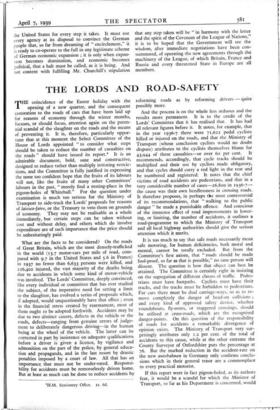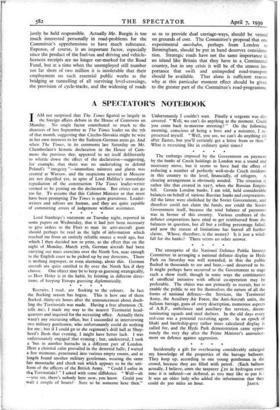THE LORDS AND ROAD-SAFETY
THE coincidence of the Easter holiday with the opening of a new quarter, and the consequent restoration to the roads of cars that have been laid up for reasons of economy through the winter months, focuses, or should focus, attention again on the peren- nial scandal of the slaughter on the roads and the means of preventing it. It is, therefore, particularly oppor- tune that at this moment the Select Committee of the House of Lords appointed " to consider what steps should be taken to reduce the number of casualties on the roads " should have issued its report.* It is an admirable document, bold, sane and constructive, designed to reduce rather than multiply irritating restac- dons, and the Committee is fully justified in expressing the none too confident hope that the fruits of its labours will not, like the fruits of many other Committees' labours in the past, " merely find a resting-place in the pigeon-holes of Whitehall." For the question under examination is much too serious for the Ministry of Transport to side-track the Lords' proposals for reasons of laissez-faire, or the Treasury to veto them on grounds of economy. They may not be realisable as a whole immediately, but certain steps can be taken without cost and without delay, and others which do involve expenditure are of such importance that the price should be unhesitatingly paid.
What are the facts to be considered? On the roads of Great Britain, which are the most densely-trafficked in the world (13.7 motor-cars per mile of road, com- pared with 9.7 in the United States and 5.6 in France) in 1937 no fewer than 6,633 persons were killed, and 226,402 injured, the vast majority of the deaths being due to accidents in which some kind of motor-vehicle was involved. The Lords' Committee, deeply convinced, like every individual or committee that has ever studied the subject, of the imperative need for setting a limit to the slaughter, has evolved a series of proposals which, if adopted, would unquestionably have that effect ; even in the financial stress created by rearmament, most of them ought to be adopted forthwith. Accidents may be due to two distinct causes, defects in the vehicle or the roads, defects—ranging from genuine errors of judge- ment to deliberately dangerous driving—in the human being at the wheel of the vehicle. The latter can be corrected in part by insistence on adequate qualifications before a driver is given a licence, by vigilance and admonition on the part of the police, by general educa- tion and propaganda, and in the last resort by drastic penalties imposed by a court of law. All that has an importance, that must not be under-rated. Responsi- bility for accidents must be remorselessly driven home. But at least as much can be done to reduce accidents by 'H.M. Stationery Office. is. 6d. reforming roads as by reforming drivers — quite possibly more.
And the process is on the whole less arduous and the results more, permanent. It is to the credit of the Lords' Committee that it has realised that. It has had all relevant figures before it. It notes, for example, that in the year 1936-7 there were 71,622 pedal cyclists killed or injured on the roads, and that the Ministry of Transport (whose conclusion cyclists would no doubt dispute) attributes to the cyclists themselves blame for 43,944 of these casualties—or over 6o per cent. It recommends, accordingly, that cycle tracks should be multiplied and their use by cyclists made obligatory, and that cycles should carry a red light in the rear and be numbered and registered. It notes that the chief victims of road accidents are pedestrians, and that in a very considerable number of cases-26,80o in 1936-7— the cause was their own heedlessness in crossing roads. It therefore proposes, in perhaps the most controversial of its recommendations, that " walking to the public danger " be made a punishable offence. And conscious of the immense effect of road improvements in lower- ing, or limiting, the number of accidents, it outlines a road-programme to which the Ministry of Transport and all local highway authorities should give the serious attention which it merits.
It is too much to say that safe roads necessarily mean safe motoring, for human deficiencies, both moral and mental, cannot be totally excluded. But from the Committee's first axiom, that " roads should be made fool-proof, so far as that is possible," no sane person will dissent. The question is how that object can best be attained. The Committee is certainly right in insisting on the segregation of different classes of traffic. Pedes- trians must have footpaths. Cyclists must have their tracks, and the tracks must be forbidden to pedestrians. For cars there must be dual carriage-ways, so as to re- move completely the danger of head-on collisions ; and every kind of approved safety device, whether roundabouts, fly-overs, or staggered crossings, should be utilised at cross-roads, which are the recognised danger-points. On this question of the responsibility of roads for accidents a remarkable divergence of opinion exists. The Ministry of Transport very sur- prisingly attributes only 1.2 per cent. of the total of accidents to this cause, while at the other extreme the County Surveyor of Oxfordshire puts the percentage at 76. But the marked reduction in the accident-rate on the new autobahnen in Germany only confirms conclu- sions which in their general tenor are a commonplace to every practical motorist.
If this report were in fact pigeon-holed, as its authors fear, it would be a scandal for which the Minister of Transport, so fir as his Department is concerned, would justly be held responsible. Actually Mr. Burgin is too much interested personally in road-problems for the Committee's apprehensions to have much substance. Expense, of course, is an important factor, especially since the product of the fuel-tax and driving and vehicle- licences receipts are no longer ear-marked for the Road Fund, but at a time when the unemployed still number not far short of two million it is intolerable that their employment on such essential public works as the bridging or tunnelling of all surviving level-crossings, the provision of cycle-tracks, and the widening of roads so as to provide dual carriage-ways, should be vetoed on grounds of cost. The Committee's proposal that one experimental autobahn, perhaps from London to Birmingham, should be put in hand deserves considera- tion. Strategic roads have not the same importance in an island like Britain that they have in a Continental country, but in any crisis it will be of the utmost im- portance that swift and unimpeded road-transport should be available. That alone is sufficient reason why at this particular moment effect should be given to the greater part of the Committee's road-programme.











































 Previous page
Previous page